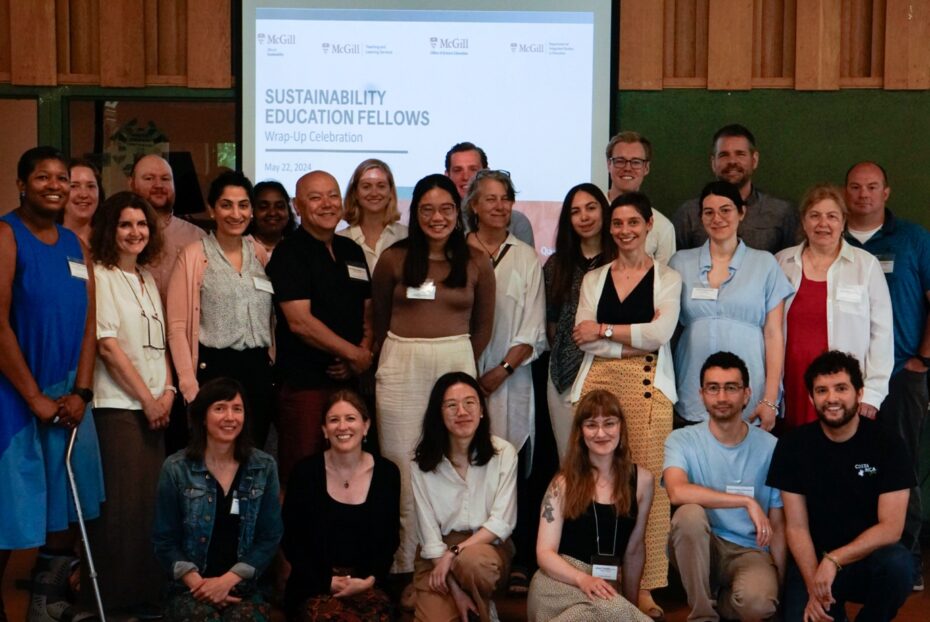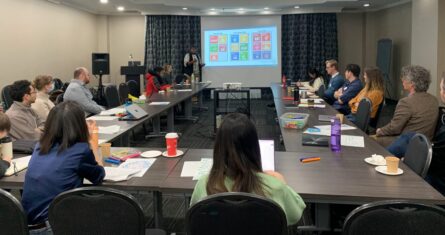
Advancing sustainability is a key part of McGill’s mission, reflected in the University’s own operations as well as in its research and teaching.
In keeping with that mission, McGill students will soon have 11 additional courses to choose from that integrate sustainability principles. Some of the courses are newly created while others have been revised.
All were developed by faculty and students paired in the Sustainability Education Fellows (SEF) program.
“The goal is to equip McGill students to be changemakers in a climate-uncertain future,” said Jessica Latus, Sustainability Officer in the Office of Sustainability.
The newly created and revised courses integrate sustainability in a range of ways, such as incorporating sustainable business strategies, redesigning a world Indigenous music course to introduce students to Iroquoian ways of thinking, designing a service-learning course where students work with children on climate action through architectural design, and rediscovering 19th-and 20th-century Hispanic literature through a lens of gender and sustainability.
“Sustainability education is about more than adding or ‘bolting on’ new curriculum,” said Stephanie Leite, a PhD candidate in Integrated Studies in Education. Leite serves as the SEF program’s pedagogical designer.
“It’s about knowledge building, while also developing the skills, attitudes and behaviours that support sustainable and just societies. Pedagogical approaches – such as land-based, project-based and culturally responsive learning approaches – are as important as course content,” she said.
‘A vital resource for instructors’

Since the program was established two years ago, 22 faculty and 23 students have participated.
“The Sustainability Education Fellows program has proven to be a vital resource for instructors who are committed to integrating sustainability into their curricula,” said Laura Winer, Director of Teaching and Learning Services (TLS) and a member of the program’s co-ordinating committee. “TLS remains dedicated to supporting this program and its mission to equip educators with the tools and knowledge they need to inspire the next generation of sustainability leaders.”
Faculty and student fellows are paired. Both receive training in sustainability pedagogies, as well as a stipend to support their work. At the same time, they join an interdisciplinary community of peers all aiming to create or redesign a course.
“Participating in the Sustainability Education Fellows program has had a lasting impact on my teaching approach,” said Mylène Riva, an Associate Professor with the Department of Geography who participated in the inaugural cohort.
“It provided me with invaluable insights and tools to rethink my courses through a sustainability lens. Even now, I continue to integrate sustainability values and principles into my curriculum, ensuring that sustainability remains a core component of my students’ learning experience.”
Lexi Kinman, a master’s student in the Department of Geography who took part in the most recent cohort, said the program introduced her to diverse ideas and approaches toward sustainability, something she found “incredibly valuable.”
“This experience has reinforced the notion that sustainability isn’t siloed into any one discipline, but rather it takes interdisciplinary collaboration to solve sustainability challenges,” Kinman said.
More to come
Looking to the future, Blane Harvey, an Associate Professor with the Department of Integrated Studies in Education who serves on the program’s co-ordinating committee, will lead a formal research study to evaluate the effectiveness of the Sustainability Education Fellows program.
“This study will provide us with data on the reach and impact of the program beyond the immediate participants,” said Harvey. “Our goal is to gain a deeper understanding of how the program influences sustainable practices and education across the institution.”
Course outlines developed by past SEF participants are available on the Teaching & Learning Knowledge Base. Reflections about Fellows experience in the SEF are available through Teaching for Learning.
